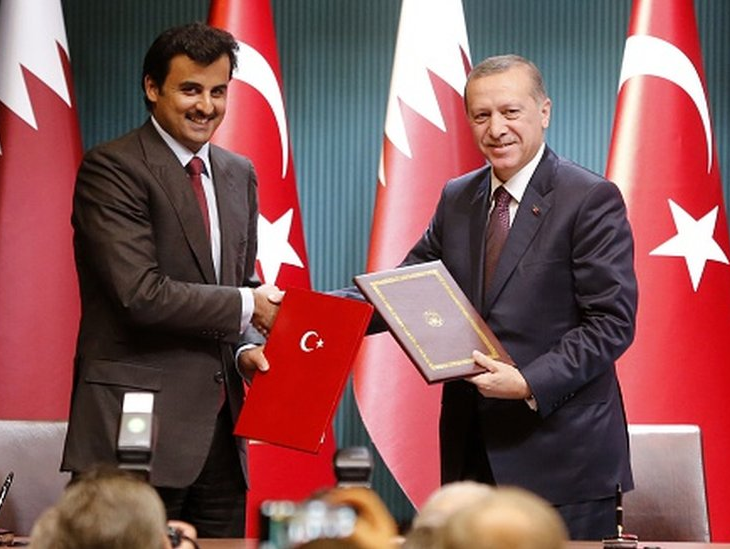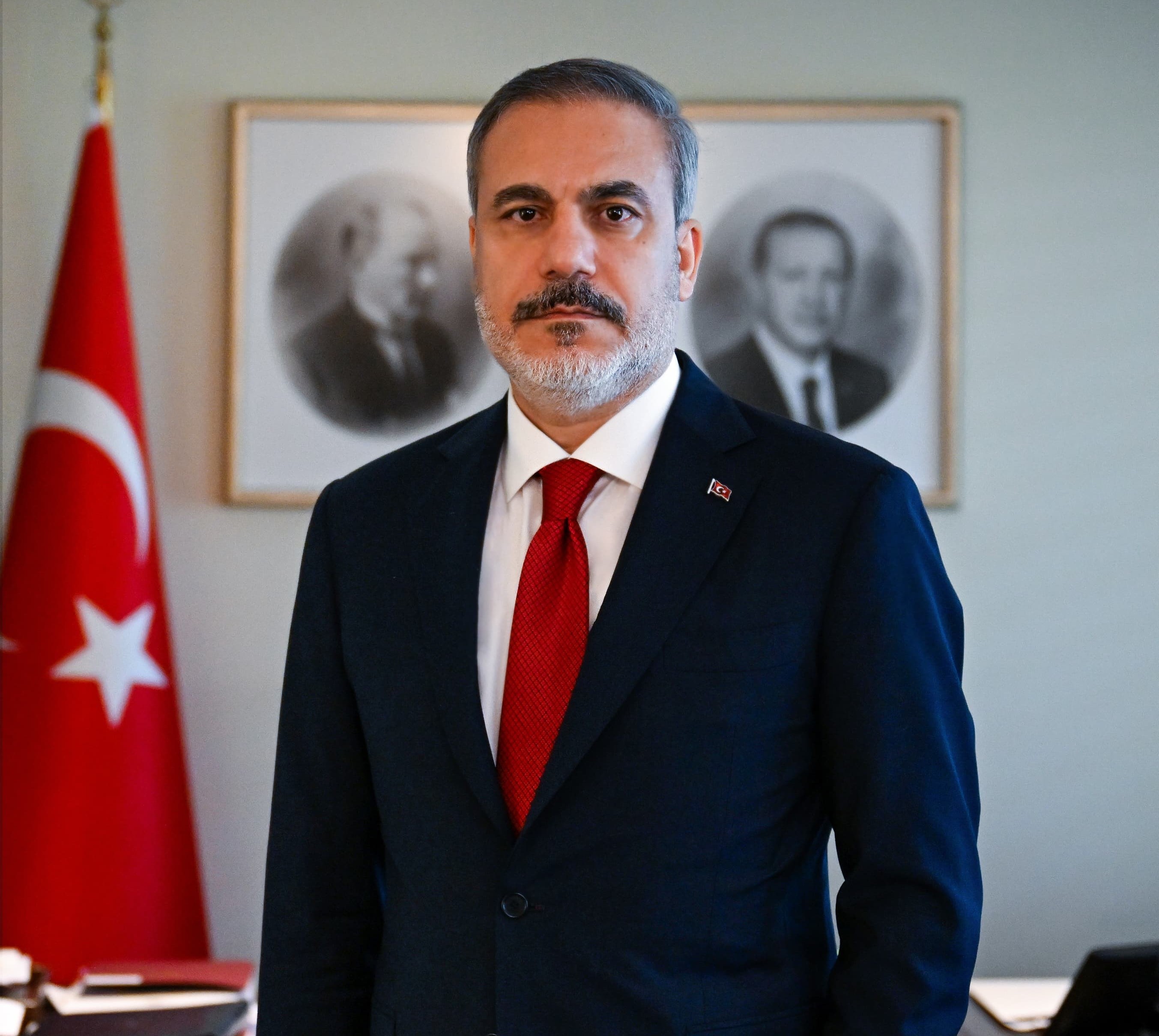Turkey-Qatar alliance seen as growing threat to Israel
Rising fast on Israel's threat matrix, the partnership between Turkey and Qatar is being labeled in Israel as a "strategic threat," especially due to their expanding presence in Syria, in addition to both countries hosting Hamas officials and enjoying sympathetic ears in the White House.

The Emir of Qatar, Hamad bin Khalifa al Thani (L) and Turkey's President Recep Tayyip Erdoğan
Israel is closely monitoring developments in Syria, but topping the list of concerns is Turkey, whose imperial ambitions and growing military-financial investments in Syria have brought it to the brink of friction with the IDF.
Rising fast on Israel's threat matrix is the burgeoning alliance between Qatar and Turkey. Israeli Intelligence officials describe it as a "strategic threat," noting both countries host Hamas officials and enjoy sympathetic ears in the White House.
As of now, Turkey and Israel maintain a deconfliction mechanism in Syria. Israel's red line, a ban on Turkish military bases, remains intact.
A senior Israeli diplomatic source told Israel Hayom the Qatar-Turkey bond is a "natural" one in the Syrian context, adding that Qatar aims to assist the emerging post-war regime. "As of now, we haven't seen troubling signs in Qatar's involvement in Syria, but that could still change."
On their bilateral ties, the source said, "There's close tracking of these relations, which are openly discussed in Qatari dialogue with the Syrians, focusing on aid and investment. Israel is monitoring closely to ensure Syria remains committed to its obligations to the international community and harbors no hostile intentions toward its neighbors."
Leading the axis
Meir Ben Shabbat, now head of the Misgav Institute, noted, "Turkey and Qatar are effectively leading the 'Muslim Brotherhood axis.' They both have regional and global ambitions and the resources to support them. They play all sides, gaining from their roles as intermediaries. With Iran's axis crumbling, Qatar and Turkey are moving into the vacuum. It's no coincidence they were the first to open embassies in Damascus under the al-Julani regime and pushed for international recognition and Syria's reconstruction."
"Even though Israel currently faces more immediate threats, we must also look at the long-term and ensure this axis doesn't pose a tangible danger to our interests.
"In that context, Israel's action in Syria to protect the Druze from al-Julani forces also serves this interest. It is better for Israel if the Druze control this strategic area rather than the al-Julani forces, who are backed by Turkey."
Alliance forged in crisis
The foundation of the Qatar-Turkey relationship dates back to the Gulf blockade imposed on Qatar in June 2017 by Saudi Arabia, the UAE, Bahrain, Egypt, and others. The demands included downgrading ties with Tehran, severing connections with terrorist organizations (including the Muslim Brotherhood), and shutting down Al Jazeera, which had inflamed protests against Arab regimes, especially that of Hosni Mubarak in Egypt.
"Turkey saved Qatar during the embargo," said Ilan Zleit, Gulf states expert at the Institute for National Security Studies. "Basic goods previously imported via Saudi Arabia reached Qatar through an air corridor from Turkey, bypassing the air, sea, and land blockade."
Today, this partnership is embodied in the thousands of Turkish troops stationed in Qatar.
Is the Erdogan-Qatar bond ideological?
"Ultimately, no," said Zleit. "They're often cast as united under the Muslim Brotherhood banner. Erdogan promotes the Islamization of Turkey and an Ottoman revival, but that doesn't appeal to Qatar.
"Their relationship is highly pragmatic. Qatar acts as Turkey's ATM for regional ambitions, especially in Libya and Syria," Zleit added. "Often, Qatar simply pays the bills, covering for Turkey's limited economic ability to support its expanding regional footprint over the past decade."

Erdogan and al-Sharaa.
Whenever Turkey, a regional military power with a robust defense industry, enters a new conflict zone - Doha makes sure the checks clear. Zleit explained, "In return, the Qataris gain leverage and influence in those theaters."
Post-Assad Syria
The Turkish-Qatari partnership is particularly visible in post-Assad Syria. Dr. Ariel Admoni, a Qatar policy researcher at Bar-Ilan University, highlighted one such initiative: "This Monday, a humanitarian agreement is expected to be signed between Turkey and Qatar. It's a code name for projects that appear benevolent but allow funding of terrorist groups. Qatar won't stop financing terrorism unless it faces US pressure. Right now, Qatar's image in Washington is at its peak, with near-total leeway on its terror ties."
Qatar quickly became a key financier of the new Syrian regime: $29 million to pay public sector salaries, a $7 billion energy project with Turkish firms, and a slew of humanitarian ventures to help rebuild the Syria of Ahmed al-Sharaa.
"Qatar wants a major role in Syria's recovery. They helped extinguish wildfires in Latakia, organized White Helmet training by Qatari police forces. They want the new Syrian entity to be dependent on them and will step in to meet every need," Admoni added.
The Erdogan heir?
Israel's intelligence community is preparing for a leadership transition in Turkey, and one name already flagged as problematic is Foreign Minister Hakan Fidan, Erdogan's close confidant.

Hakan Fidan. The man behind the vision.
Fidan isn't a typical politician, he's the architect of Erdogan's neo-Ottoman vision. He previously headed Turkey's National Intelligence Organization (MIT) for 13 years until 2023. He was the key back-channel operator with Syrian rebels pre-Assad, maintains strong ties with Hamas, and was one of the first foreign officials to visit Damascus after the regime change.
German media even revealed his contacts with Qassem Soleimani, underscoring his ability to navigate between all regional players. Among Israeli intelligence circles, he's seen as one of Erdogan's possible successors.
If he assumes the presidency while Turkey controls territory near the Israeli border, it could represent a genuine threat that might lead to direct conflict.
No comments:
Post a Comment